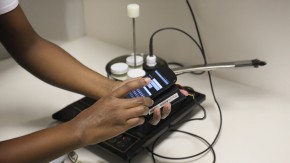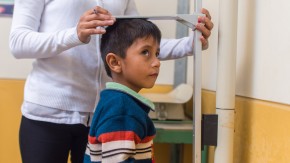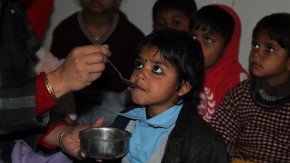
When she was a grad student, Dr. Nithya Ramanathan's father, a climate scientist, posed her a challenge: The traditional coal- and kerosene-based cookstoves used in many poor countries come with serious risks for the health of the women who use them, their families, and the environment, so she should design a cleaner one. She and fellow grad student Martin Lukac set out to do this, but first they spent a lot of time talking to women who used cookstoves - or, more accurately, listening to women who used cookstoves. They asked questions about what they wanted and what they needed, asked questions about the stove designs and prototypes, and ended up understanding which cleaner cookstove women might actually use. Dr. Ramanathan and Dr. Lukac let the lesson they learned - take your cue from the people on the ground - guide them ever since, and it still guides them as the heads of Nexleaf, a nonprofit organization that's collaborating with the governments of low- and middle-income countries to keep millions of children around the world healthy.
Vaccines are incredibly vulnerable. They have to be stored and transported under certain conditions, and if those conditions change at any point in what's known as the "cold chain," the potency of the vaccines is at risk. Half a day at too hot a temperature will ruin some vaccines; as little as an hour at too cold a temperature will ruin others. That's why in poor and middle-income countries, vaccine temperatures tend to be recorded on paper charts whenever they're loaded on or unloaded from trucks, transferred into or out of storage, and at the beginning and end of every day at health facilities. But there's a lot that such a system doesn't keep track of. There's no way for nurses to know when they open a health facility in the morning, for example, whether an overactive refrigerator ruined the vaccines overnight - in which case some children could be left vulnerable to diseases. Or whether the truck the vaccines were transported in was too cold, and their shelf-life diminished before they even arrived.
With a 2012 grant from the Grand Challenges Explorations call for proposals to optimize vaccine delivery systems, Dr. Ramanathan and Dr. Lukac knew that they couldn't optimize the cold chain until they knew where it needed optimizing. So they decided to consult with the experts: the health workers, technicians, and managers of health facilities. Dr. Lukac traveled to Haiti, and when the team expanded to include Shahrzad Yavari as the program lead, they went to Kenya together. They didn't tell the health facility workers what to change; they just asked questions, a lot of questions, to find out where they needed help. A lot of the nurses Yavari spoke with, for example, spent their evenings, weekends, and holidays worried about vaccine temperatures. But the nurses also worried that, if they found out that, say, a refrigerator was malfunctioning, there wouldn't be much they could do about it. And they knew from experience that it took days or weeks for their written requests for spare parts to reach the right person - that is, assuming those requests didn't get lost along the way.
Armed with what they'd learned from the professionals on the ground, the Nexleaf team got to work gathering data. Using inexpensive, off-the-shelf sensors, they began monitoring vaccine temperatures at several health facilities so that they could compare the data with the paper records; what they found was that only 10% of "excursions" out of the safe range of temperatures were being captured by the paper charts. But that was just the beginning. The data showed a lot more: power outages at night, for example, which they had assumed would be the cause of the majority of the excursions, only contributed to a third of the excursions, while flat batteries in solar fridges - even new ones - contributed to more than two thirds. Not only were there serious flaws in the system, but they weren't the flaws anybody had expected.
With this data, Nexleaf received a follow-on grant to work with the health professionals on designing software to go with the sensors and, more importantly, a Remote Temperature Monitoring (RTM) system. The healthcare workers were suspicious at first - they worried they were being monitored - but as time went on they began to love the system: it gave them a mobile-based system robust enough to report every excursion but flexible enough to let them deal with the unexpected in whatever way they knew made the most sense. It also gave them the power to escalate problems to the right people at the right time. Any time there was an excursion, the nurses would get SMS alerts; if they weren't able to fix the problem themselves in 10 to 20 hours, the software would automatically notify a manager. Since then, the system has evolved and now keeps track of what locations have spare parts on hand, who needs further training, and so on. In short, RTM lets everybody know what they need to know when they need to know it and, just as important, it empowers them all to do what needs to be done.
The government of India has adopted Nexleaf's RTM - along with software created by Logistimo, another Grand Challenges Explorations grantee - as part of a new immunization network; to date, RTM is keeping vaccines safe at 15,000 health facilities across the country, and that number continues to grow. The system has spread to Kenya, Mozambique, and Tanzania, for starters, and Nexleaf has also helped several other countries with more specific cold-chain issues.
It's one thing to make a discovery or invent a device - it's quite another thing to bring it to people in a way that gives them what they need, when they need it, without forcing them to make huge, disruptive changes in the way they live their lives. But Dr. Ramanathan, Dr. Lukac, and Director Yavari have done just that, and the result is that we're much closer to a world in which every child, in even the most remote reaches of countries as huge as India, gets a fully potent vaccine.



